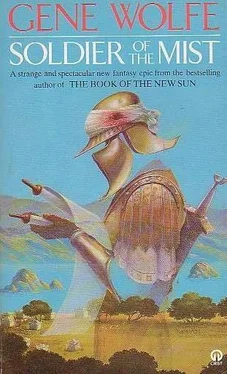Gene Wolfe - Soldier of the mist
Здесь есть возможность читать онлайн «Gene Wolfe - Soldier of the mist» весь текст электронной книги совершенно бесплатно (целиком полную версию без сокращений). В некоторых случаях можно слушать аудио, скачать через торрент в формате fb2 и присутствует краткое содержание. Жанр: Фэнтези, на английском языке. Описание произведения, (предисловие) а так же отзывы посетителей доступны на портале библиотеки ЛибКат.
- Название:Soldier of the mist
- Автор:
- Жанр:
- Год:неизвестен
- ISBN:нет данных
- Рейтинг книги:3 / 5. Голосов: 1
-
Избранное:Добавить в избранное
- Отзывы:
-
Ваша оценка:
- 60
- 1
- 2
- 3
- 4
- 5
Soldier of the mist: краткое содержание, описание и аннотация
Предлагаем к чтению аннотацию, описание, краткое содержание или предисловие (зависит от того, что написал сам автор книги «Soldier of the mist»). Если вы не нашли необходимую информацию о книге — напишите в комментариях, мы постараемся отыскать её.
Soldier of the mist — читать онлайн бесплатно полную книгу (весь текст) целиком
Ниже представлен текст книги, разбитый по страницам. Система сохранения места последней прочитанной страницы, позволяет с удобством читать онлайн бесплатно книгу «Soldier of the mist», без необходимости каждый раз заново искать на чём Вы остановились. Поставьте закладку, и сможете в любой момент перейти на страницу, на которой закончили чтение.
Интервал:
Закладка:
"As you command, Maiden, and gladly."
"Not so gladly when the time comes, perhaps. But first you must return to the walls you fled, return with the dawn. Will you do that?"
"It's dawn now," I told her. "Can I run so fast? I will if I can."
"Your foes seek your life. Be wary. As the sun rises, you will see a woman and a child walking hand in hand. Draw your sword and give it to the child. Do you understand?"
I nodded. "I will do just as you've said, Maiden."
"Then when you find the wolf, grasp its ear, cut its throat, and speak my name. Go now, do that, and my promise will be fulfilled."
The city was far out of sight to the west; yet I saw it, its gray walls, grim with a hundred towers, rising high above the tents of the besiegers. I sprinted toward it, and it vanished; but I continued to run, leaping stones and loping across fields of stubble until I reached in truth the tents I had seen falsely through the eyes of the goddess.
Here soldiers woke and spat like other men, goaded by the braying of the trumpets-buckled on their armor, took up spears and hoplons marked with the inverted ox of Thought, and formed ragged files that were soon straightened by the curses of their enomotarches. Some looked at me curiously, and I waved this scroll above my head so they would think me a messenger; no one stopped me.
The tents ended. I reached a place where houses and shops had stood outside the walls. They had been burned, though whether by the besiegers or the besieged I cannot say. There were towers and sheds on wheels, and ramps of clay and wood. Worse, the tumbled stones and tiles of the ruined houses threatened to trip me with every stride. Once I noted a dented pan among the ruins, and once a scattered string of coral beads. I thought then of the misery of poor women I would perhaps never see.
Soon I was within bowshot of the walls. An archer there kindly told me so, sending his shaft whizzing past my eyes to bury itself in the blackened ground to my right, so that I returned this scroll to my belt and ran wider.
Already the sun was well above the horizon behind me. The Maiden had said I was to give my sword to the child "as the sun rises," but it seemed to me it was impossible that day. Yet I continued to run, or rather to trot, circling the walls in search of the woman and the child.
The temptation always was to go too near, for by curving my path more sharply I could have decreased its length. Twice more archers loosed at me, their long-flying arrows falling at last almost at my feet.
I had made a half circle when I saw them-a woman in a purple gown and a child in a torn gray peplos, hand in hand, so deep in the shadow of the wall that the soldiers on it might have slain them with stones had they wished.
At the same instant a wounded man shouted, drew his sword, and dashed toward me. I marveled at his courage, for he had lost his left forearm not long before; the stump was still bandaged below the elbow, and the bandage was still gay with his blood. I had drawn my own sword before I remembered the words of the Maiden, who had perhaps desired that fight this one-armed man without it. That seemed no more than just, for surely he was still weak from his wound. I ran to the woman and the child then with all the speed I could command, extending my sword to the child hilt foremost.
She accepted it readily; but when I turned, others were sprinting after the one-armed man. One fell with an arrow through his throat, but two more caught the one-armed man, wrestling his sword from his hand and pulling him to safety. As I watched them, I was bathed in gold. The sun had risen above the city wall, bringing a second dawn.
Still other men, shieldmen in armor, dashed from the wall to take us. They dragged me, with the woman and the child, into a doorway so deeply set that it was like a tunnel ending in a narrow door. When this door swung back, we were in the besieged city. Houses of two and even three stories were set thickly along the narrow street, many with their backs formed by the wall. The men who held us seemed not otherwise than the men outside who warred on them; but with them were soldiers not like them at all, soldiers whose curling beards were black instead of brown, and who wore loose trousers of yellow, blue, and green.
They bore us to the citadel and took the woman from us, and with her my sword as well. Now we are shut up in this guard room, where at Io's urging (for this child is the slave girl I told the Maiden I would sacrifice if she wished it) I write my account.
CHAPTER XLII-Though Not Without Aid
I have defeated three men, guards of the satrap from Susa. They were Hellenes, though in Sestos the Hellenes do not govern themselves, as Io explained when I had finished writing of our capture. So it is, she says, wherever the Hellenes live on this side of the Water.
"All the better for them," I said, "assuming that the men of Parsa are wise and just. These Hellenes are proud, grasping, and turbulent; brilliant, perhaps, but without any real feeling for the duties of the citizen and the majesty of the state."
She agreed, then asked in a whisper whether I thought someone was listening.
"No," I said. "I speak my mind-the simple truth."
"But I'm a Hellene myself, master."
"I was considering the men. The woman are better, perhaps, yet wanton."
"You only say that because you saw them in Kalleos's house, mostly. Do you remember her? Or Phye? Or Zoe, or any of the others?"
I shook my head. "I only know how these Hellenes have seemed to me." I sought to take the sting from my words. "Their children are beautiful and very kind."
She smiled. "I'm the only one you've had much to do with. But maybe you're right anyway about the men and women. What do you know about the People from Parsa?"
"It was they who commanded the soldiers who brought us into this city; but though I feel sure I've seen them before, I can't remember where."
"I saw them back in Hill. They don't talk like we do, and they keep their women out of sight even more than the people do in Thought. And I saw one on the wall yesterday. That was how I knew how to get Drakaina into Sestos."
I asked whether Drakaina was the woman in the purple gown, and Io nodded.
"She wanted to get inside so she could talk to the People from Parsa for the regent, but she didn't know how. Only yesterday, you and she and Pasicrates walked around looking at the towers on wheels, and I saw a man from Parsa on the wall watching her. The jewels on his cap and in his rings caught the light, so I knew he must be an important man, and from the way he looked at Drakaina I knew that if she ever came near the wall he'd have soldiers come out and get her. Then you fought with Pasicrates and ran away, and I thought I ought to go in with her, so that maybe I could get him to help you. The Rope Makers will probably kill you if they ever catch us again."
"Who's Pasicrates?" I asked, not liking to hear that I had run from him.
"He's the head Rope Maker out there," Io told me. "Or he was. I'll tell you about him if you want, then you can read about him in your book. We're going to have plenty of time, I suppose."
Io had no sooner spoken than the door swung wide. I expected to see soldiers like those who had brought us here, perhaps with an officer from Parsa; but these were all barbarians with long trousers and cloth-draped heads. I found I knew already what sorts of faces they would have and how they would be armed. Yet because I did not know I would recall those things until I saw them, I will write something of them here.
Their hands and faces are the only parts of their bodies they do not cover; and sometimes they cover even their faces, pulling up the cloth that conceals the neck to keep dust from the nose and mouth. Instead of sandals they wear shoes (which I think must be very uncomfortable) so that no part of the foot can be seen. Among the Hellenes bright colors are worn often, but garments are all of one hue save perhaps for a band at the edge. The People from Parsa have half a dozen different colors in the same cloth. Even soldiers like those who came for us do not wear much armor.
Читать дальшеИнтервал:
Закладка:
Похожие книги на «Soldier of the mist»
Представляем Вашему вниманию похожие книги на «Soldier of the mist» списком для выбора. Мы отобрали схожую по названию и смыслу литературу в надежде предоставить читателям больше вариантов отыскать новые, интересные, ещё непрочитанные произведения.
Обсуждение, отзывы о книге «Soldier of the mist» и просто собственные мнения читателей. Оставьте ваши комментарии, напишите, что Вы думаете о произведении, его смысле или главных героях. Укажите что конкретно понравилось, а что нет, и почему Вы так считаете.








